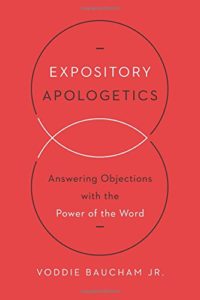Book Review: Expository Apologetics by Voddie Baucham
I was twelve years old when I got into my first, real debate. I had stumbled across a scientific review which claimed that believers who held to a literal account of Creation were old-fashioned and ignorant. I got fired up instantly. For the past two years, I had immersed myself in young-earth science, reading every creationist article and book I could find. I had poured over the facts, memorized the data, and driven deep into the theological and apologetic roots of Genesis 1-11. I wanted to test my knowledge on someone who had also studied the evidence, and I thought this was the perfect opportunity.
I grabbed the family laptop and pounded out an email crammed with facts, scientific data and Scripture references. It ended with a grand theological flourish in which I showed that to mesh the two opposing worldviews is not only ignorant and dangerous, but downright evil. If I were to go back now and read it, I would certainly see the rough edges, the assumptions and the eager recklessness of a kid who thought she knew more about science than the guy with the Ph.D. Back then, I thought I was on fire.
Everything I said was true, but it did little to open a sincere and helpful discussion. The scientist and I sparred back and forth for a while, the argument escalating when he accused me of lying about my age, and claimed that I had been “indoctrinated” into the “old-fashioned view of Scripture”. Eventually, my Mom had to get involved, which was an abrupt and somewhat embarrassing end to my first online debate.
As a child, I was actively looking for opportunities to evangelize and share the Gospel. My motivations were not always pure. I was one of those kids that get puffed full of air the minute they learn something, wanting to exhale wisdom on the next poor, unsuspecting soul. But at least I was eager. Sometimes, I wish I still had the naïve boldness of my twelve-year-old self.
Even though my understanding and growth in Christ has increased by God’s grace, since then, my fear of others has increased as well. I know the dangers of getting caught up in the confusion and confrontation of the world, and I want to avoid it. If I remain silent, nothing gets damaged. The conversation passes without tension. The friendship remains pleasant and simple. My own deep-seated pride escapes unscarred.
But as Christians, the price of silence is obedience. Ironically, when we sit with our hands folded in our laps, our heads down, and our lips pressed together for the general comfort of all involved, we sacrifice the greater good of all involved.
Avoiding Awkwardness is the idol before which American Christians slaughter the commands of Christ, biblical truth, and meaningful conversation. Compared to the high price believers around the world pay daily for their belief in the Gospel, our silence is not only laughable, it is contemptible. It is not only petty, it is wicked.
We know this. We know that we, as Christians, are called to “make disciples” (Matthew 28:19). We are commanded to “be always ready to give an answer” (1 Peter 3:15) We are ambassadors of a king, soldiers in a war, and we must be prepared to “give a defense for the hope that in us” (1 Peter 3:15). If we are to do this, we must know what we believe, why we believe it and how to communicate in an effective and gracious way to others. Pastor, theologian and apologist, Dr. Voddie Baucham, explains precisely how to do this in his book, Expository Apologetics.

The book is easy to understand and relatively short, with the chapters dividing roughly into three parts.
Part 1 explains how the goal of Christian apologetics is “not about winning arguments; it’s about winning souls.” Many Christians (myself included) give a whole host of excuses for why we are not qualified to practice apologetics, such as, “I need to know a lot to practice apologetics;” “Apologetics is for pastors, teachers, and missionaries;” and “It is rude to argue about faith and religion.” Part 1 addresses these objections and looks at examples of apologetics in Scripture, so that we can model our evangelism off of what God tells us in His Word.
But we can’t defend our faith unless we know what our faith is. Chapters 5 and 6 discuss this issue, providing a general understanding of the creeds, confessions, and catechisms of Christianity. It also shows how we can apply the biblical doctrines of the Church throughout the millennia, to our conversations with unbelievers every day.
Chapters 7-9 get down to the practical how-to. These chapters show how we can address cultural issues in a biblical manner, not only starting a meaningful discussion, but one that ultimately leads to the Gospel of Christ.
Why Should I Read It?
Because we are all called to be apologists. We are all called to know what we believe, why we believe it and to communicate it effectively to others. Expository Apologetics explains how to do this with clear scriptural and cultural examples, and provides a biblical foundation with practical methods of application. We believe the Gospel. We have the command. How then shall we preach?

Hi My Honey – Great post! I think you should send this to article to the Ph.D. guy you were sparring with when you were 12. May start him thinking again. Maybe he’ll even believe your age this time!
Love you so much!
Gigi
Thanks so much! Haha that’d probably be a great opportunity to practice what I’ve learned in this book 😉 Thanks so much for reading! Love you